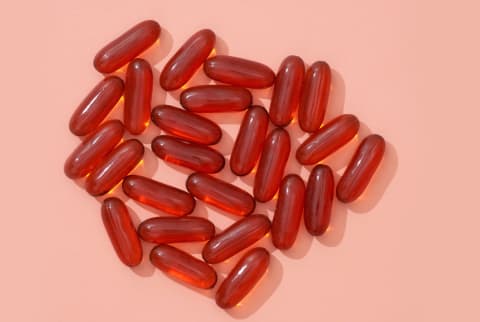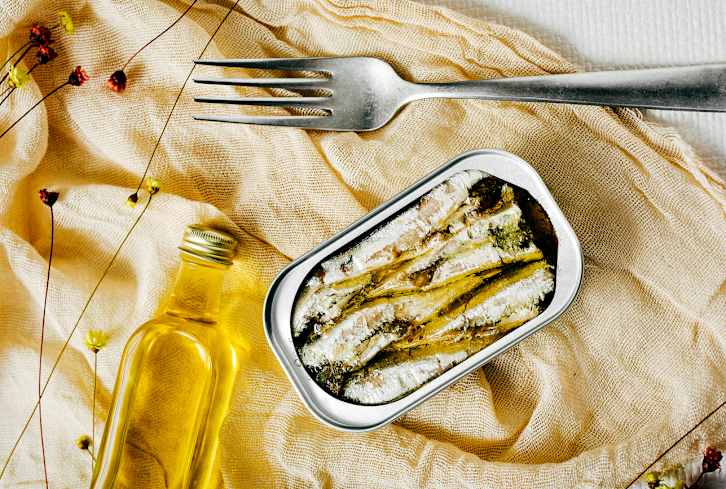Advertisement
Krill Oil: The Omega-3-Rich Oil That Claims To Be Better Than Fish Oil



Nutritionists, doctors, and medical associations1 agree: We should be eating at least two servings of fatty fish per week to reap the head-to-toe benefits of their omega-3 fatty acids. But the fact is, we're just not doing it. "I'm alarmed that over 90 percent2 of Americans are deficient in the crucial fatty acids eicosapentaenoic acid (EPA) and docosahexaenoic acid (DHA)," says Mark Hyman, M.D., functional medicine practitioner and mbg Collective member.
These omega-3s—found in fish like salmon, sardines, anchovies, and mackerel—are crucial for proper development, cardiovascular protection, and brain health. Deficiencies in omega-3 fatty acids have even been associated with increased depression and anxiety. All of this has prompted many doctors to start recommending DHA- and EPA-rich supplements to their patients. In fact, Dr. Hyman says they're basically mandatory if you don't eat fish.
But now, fish oil pills aren't your only option for a boost of anti-inflammatory DHA and EPA. Krill oil—a relative newcomer to the supplement aisle, which you may have seen sold as the popular Mega Red Krill Oil—boasts an impressive fatty acid profile, along with a few other nutrients that regular fish oil is missing. Which raises the question, is krill oil the better option?
What exactly is krill oil?
Krill oil is derived from Antarctic krill, small shrimplike crustaceans that live in waters near the Antarctic peninsula and serve as a source of food for various fishes, birds, and whales. In the production process, krill are crushed and their lipids are extracted using either acetone or alcohol as a solvent, depending on the manufacturer, which is then evaporated off. (More on this in the supplement section below.)
The resulting oil is rich in the same types of omega-3s as fish oil, EPA, and DHA. In addition to these healthy fats, it contains some other promising nutritional perks. Because krill feed mainly on phytoplankton, which is rich in the carotenoid antioxidant astaxanthin, krill oil also contains this antioxidant.
Krill oil vs. fish oil: What's the difference?
Let's start with the obvious. Krill oil is sourced from krill while fish oil is typically sourced from a combination of fish such as anchovies, herring, sardines, salmon, and mackerel. They look different, too. Unlike fish oil, krill oil is a reddish color due to the presence of astaxanthin. This antioxidant has been shown to cross the blood-brain barrier, and emerging research3 suggests it has powerful neuroprotective effects and benefits for skin.
Both krill oil and fish oil contain the fatty acids EPA and DHA, but fish oil has a higher concentration of these than krill oil (for example, a 1,000-mg dose of this fish oil contains 180 mg EPA and 120 mg DHA, while a 1,000-mg dose of this krill oil contains 128 mg EPA and 60 mg DHA). But due to a difference in the way the fatty acids in krill oil are structured, they may potentially be easier for your body to absorb4. Specifically, the majority of the omega-3s in krill oil are attached to phospholipids, while the omega-3s in fish oil are attached to triglycerides. Phospholipids may be more easily absorbed because our cell walls are also made of phospholipids.5
The answer to the question "Is krill oil more bioavailable than fish oil?" is still a complicated one, though. One study6 found that taking either krill oil or fish oil resulted in similar levels of EPA and DHA in the blood, even though the krill oil contained lower concentrations of EPA and DHA—which would suggest increased bioavailability. However, this claim looks far less impressive when you realize that the amount of krill oil needed to achieve this effect was actually higher—543 mg of krill oil compared to 864 mg of fish oil! So, at this point, the jury on krill's superior omega-3 bioavailability is still out.
Another difference: Across brands, krill oil is significantly more expensive than fish oil. But, according to several accounts, it's also far less likely to give you "fish burps" due to its phospholipid structure (which, honestly, might be worth the money).
What are the health benefits of krill oil?
While it hasn't been nearly as well-researched as fish oil, preliminary studies suggest krill oil holds promise for a variety of conditions, from high cholesterol to premenstrual syndrome. Many krill oil benefits are similar to those of fish oil and can likely be attributed to the omega-3s EPA and DHA. A few studies, however, suggest that krill oil may be more effective than fish oil for certain conditions, but higher quality research is needed to confirm these. Here are some of the most promising krill oil benefits to date:
It may significantly lower cholesterol.
Omega-3 fats, especially EPA and DHA, are widely considered to be heart-healthy7. So it's not surprising that krill oil has been shown to improve various risk factors for heart disease. A 2017 review8 of seven studies found that krill oil was effective at lowering "bad" LDL cholesterol (by as much as 34 percent), lowering triglycerides, and increasing "good" HDL cholesterol. Individual studies9 suggest that a dose of 1 to 3 g of krill oil per day is sufficient to reap these benefits.
In another study10 comparing krill oil (500 mg per day) and purified omega-3s (1,000 mg per day), krill oil was found to be more effective at raising "good" HDL cholesterol and reducing C-reactive protein, a marker of inflammation.
It may reduce PMS symptoms.
PMS is no joke. So the idea of finding a natural remedy is pretty appealing. The good news: Several studies show that fish oil may help and that krill oil may be even better, thanks to their anti-inflammatory properties. In one study11, women who typically suffered from PMS were assigned 1 g of either krill oil or fish oil twice a day for three months. Women taking the krill oil took significantly less pain medication compared to women taking the fish oil, and researchers concluded that the krill oil significantly reduced cramps as well as the emotional symptoms of PMS. (If PMS is a problem for you, consider these five more natural cures for PMS!)
It may ease achy joints.
Omega-3s have been shown to have anti-inflammatory effects in the body—and these may translate to very real benefits for people with painful joints. In one study12, subjects with osteoarthritis or rheumatoid arthritis received a daily 300-mg dose of krill oil or a placebo for 30 days. Within just seven to 14 days, most patients taking the krill oil experienced a reduction in pain symptoms, along with a reduction in the inflammatory marker C-reactive protein.
It may reduce risk of dementia.
Omega-3-rich fish consumption has been consistently associated with decreased risk of cognitive decline13, and research reveals that patients with Alzheimer's tend to have lower levels of DHA14 in the brain than healthy people. DHA, found in fish and krill oil, is an essential component of cellular membrane phospholipids in the brain, and because of this, researchers believe it helps maintain healthy neurons15 and cell membranes.
So it would make sense that supplementing with a DHA-rich omega-3 supplement like krill oil may help brain health—and research is beginning to support this. While supplementing with omega-3s may not help people with established Alzheimer's or dementia, one study16 found that it improved attention, processing speed, and recall among people with mild cognitive impairment. Additionally, an animal study17 found that krill oil helped improve cognitive function, reduce anxiety, and reduce levels of beta-amyloid, a protein associated with Alzheimer's disease.
It may reduce stress and anxiety.
Adding to their mental perks, omega-3s have been found to help alleviate stress and stress-related damage, too. One study18 found that taking a daily fish oil supplement (containing 60 mg of EPA and 252 mg of DHA) for just three weeks reduced several stress markers including cortisol and adrenaline. While this study was done with fish oil, krill oil would likely have similar benefits if taken at a dose containing sufficient EPA and DHA content. EPA, specifically, seems to be very beneficial for regulating mood and behavior, says Dr. Hyman.
It may support the body's endocannabinoid system.
Omega-3 fatty acids have been shown to help support our body's endocannabinoid system (ECS)—a network of enzymes and receptors that play a role in regulating pain, stress, anxiety, and inflammation. Basically, the ECS interacts with compounds called cannabinoids that we either produce naturally in our body (from omega-3s that we've consumed) or that we ingest directly (from plants like hemp, via CBD oil). These compounds then bind to cannabinoid receptors in the body, which are believed to help mediate pain and boost the immune system. So consuming enough omega-3s—from sources like krill oil, fish oil, and fatty fish—is crucial for keeping the ECS functioning optimally. This is important because the ECS may play a role in many of the benefits listed above.
It may boost the health of your skin.
While you shouldn't toss your sunscreen just yet, research on humans does show that supplementation with omega-3s (whether from krill oil, fish oil, or plant-based omega-3s) provides a layer of photoprotection19 that helps keep inflammation in check and protect you from the sun's harmful UV rays. Additionally, lab research19 suggests that EPA, specifically, may reduce collagen damage caused by repeated exposure to UV radiation. Krill oil also happens to be one of Dr. Frank Lipman's favorite supplements for healthy summer skin (along with alpha-lipoic acid and vitamin D3), thanks to its astaxanthin content, which, he says, "supports skin health and helps protect against sun damage."
What are the side effects of taking krill oil?
If you decide you want to try krill oil, the typical suggested dose20 is 1 to 3 grams daily. As is the case with omega-3 fish oil supplements, taking krill oil in recommended amounts doesn't appear to have any major side effects. The most common side effects are minor and similar to those of fish oil including indigestion, diarrhea, bloating, cramps, gas, and fishy-tasting burps. That said, you should not take krill oil if you have allergies to fish, shellfish, or any type of seafood, as it could cause a serious allergic reaction.
Omega-3 supplements like krill oil could interact with blood-thinning medications such as Coumadin (warfarin), since omega-3s also have a mild blood-thinning effect. But you may still be able to take krill oil while on one of these medications if the dose is low enough. Typically, problems don't arise unless the krill oil dose exceeds 3 g (3,000 mg), but consult with your doctor to be sure. It's also recommended to avoid krill oil for two weeks leading up to surgery so it doesn't interfere with blood clotting.
What to look for in a krill oil supplement.
There are a few manufacturers, who produce the krill oil extracts under the following names: Neptune Krill Oil (found in the popular Mega Red krill oil supplement), Rimfrost, Superba, and K-REAL. Nearly all supplement brands that sell krill oil will feature one of these extracts, and they likely all have similar benefits. One significant difference, however, is that Neptune uses acetone in its extraction process while the others use ethanol (food-grade alcohol).
With krill oil, sustainability is also a concern. Many ecologists are worried that the continued fishing of Antarctic krill will essentially steal food from already declining penguin, whale, and fish populations. To combat this, seek out a product that is certified sustainable by a reputable third party. Both Rimfrost and Superba are certified by the Marine Stewardship Council (MSC), which is the gold-standard for marine sustainability, while Neptune and K-REAL are certified by Friend of the Sea (FOS), which has been called out for not being as stringent with its sustainability standards.
As far as contamination goes, krill oil supplements frequently claim that their product is lower in environmental toxins than fish oil because krill is sourced from pristine Antarctic waters. However, when krill and fish oil were tested for contaminants during a 2014 study21, it found that krill oil supplements contained intermediate levels of persistent organic pollutants (POPs) compared to the other products analyzed. None of the krill oil supplements exceeded chemical guideline thresholds, but they weren't exactly "pristine" either.
To ensure you're getting a krill oil supplement low in environmental toxins, seek out a brand that's been tested by an organization like The International Fish Oil Standards (IFOS). They test for lead, mercury, and PCBs and verify the omega-3 content listed on the label. Some IFOS certified brands include Nutratec Life Sciences and Nutrigold. You can search for the full list of product reports on the IFOS website here.
The bottom line on krill oil.
Krill oil is an effective means of boosting blood levels of the health-promoting omega-3 fatty acids EPA and DHA, and it likely delivers many of the benefits that have been attributed to omega-3 fats from other sources. It also offers some unique benefits, thanks to its astaxanthin content. However, research is still inconclusive as to whether krill oil works as well or better than fish oil, and we won't know the answer until more comprehensive studies are performed. Overall, krill looks promising and is likely safe if you pick a reputable brand, but most doctors don't necessarily recommend it over a quality fish oil supplement at this time, especially given the increased cost.
21 Sources
- https://www.heart.org/en/healthy-living/healthy-eating/eat-smart/fats/fish-and-omega-3-fatty-acids
- https://www.ncbi.nlm.nih.gov/pmc/articles/PMC3775234/
- https://www.ncbi.nlm.nih.gov/pmc/articles/PMC5352583/
- https://ods.od.nih.gov/factsheets/Omega3FattyAcids-HealthProfessional/
- https://www.ncbi.nlm.nih.gov/books/NBK26871/
- https://www.ncbi.nlm.nih.gov/pmc/articles/PMC3024511/
- https://www.ncbi.nlm.nih.gov/pubmed/25062404
- https://www.ncbi.nlm.nih.gov/pubmed/28371906
- https://www.ncbi.nlm.nih.gov/pubmed/15656713
- https://www.ncbi.nlm.nih.gov/pubmed/27279841
- https://www.ncbi.nlm.nih.gov/pubmed/12777162
- https://www.ncbi.nlm.nih.gov/pubmed/17353582
- https://www.ncbi.nlm.nih.gov/pubmed/17413117?dopt=Abstract
- https://www.ncbi.nlm.nih.gov/pubmed/12654166?dopt=Abstract
- https://www.ncbi.nlm.nih.gov/pubmed/22696350?dopt=Abstract
- https://www.ncbi.nlm.nih.gov/pubmed/22305186?dopt=Abstract
- https://www.ncbi.nlm.nih.gov/pubmed/29350764
- https://www.ncbi.nlm.nih.gov/pubmed/23390041
- https://lpi.oregonstate.edu/mic/health-disease/skin-health/essential-fatty-acids#functions
- https://ods.od.nih.gov/factsheets/Omega3FattyAcids-HealthProfessional/#h4
- https://www.ncbi.nlm.nih.gov/pmc/articles/PMC4179167/


















